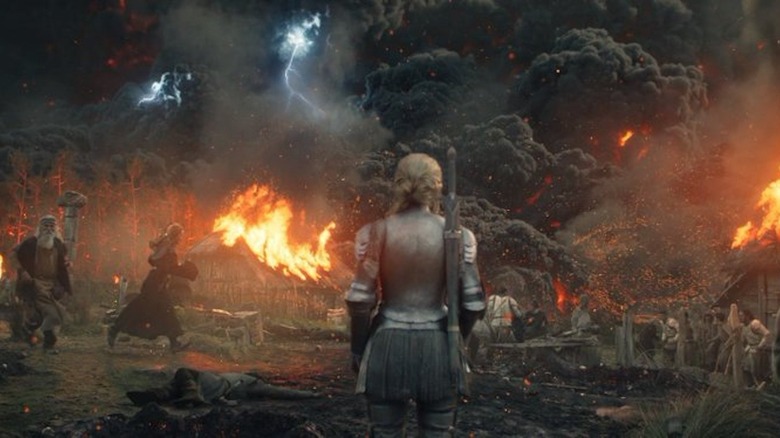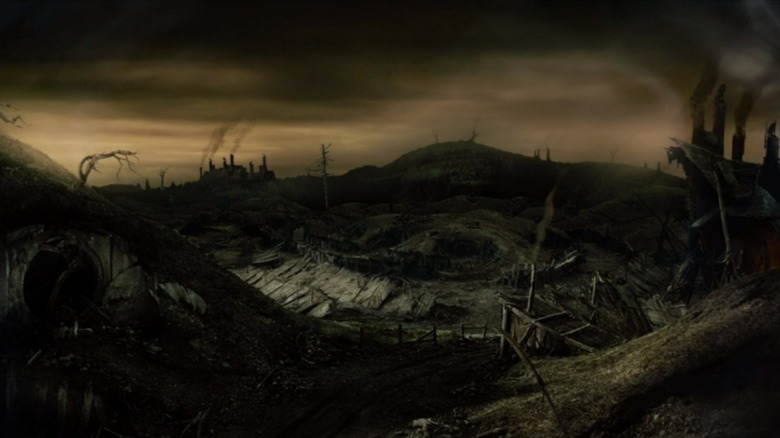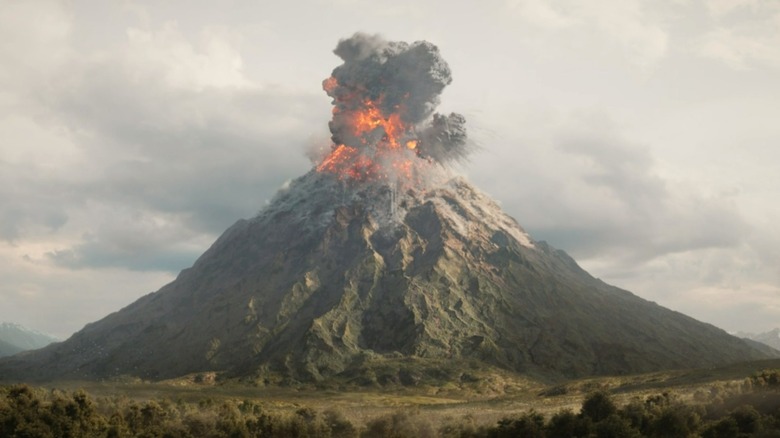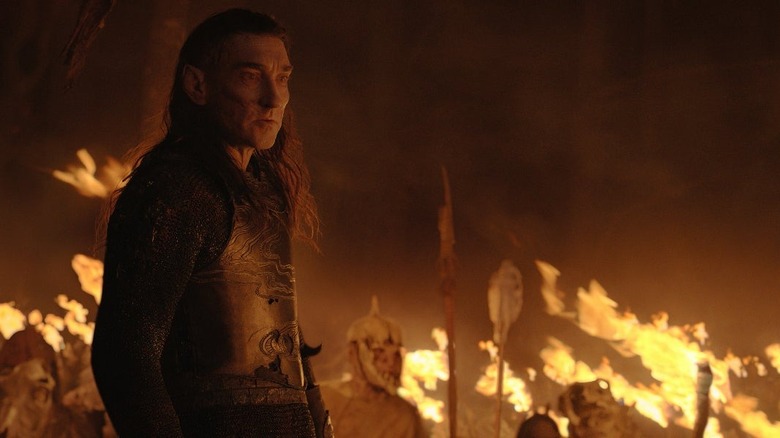The Third Act Twist Of The Rings Of Power Episode 6 Is A Callback To J.R.R. Tolkien's Greatest Unfilmed Tragedy
One does not simply walk into this article without having seen the latest episode of "The Lord of the Rings: The Rings of Power" first. Major spoilers follow!
Darkness is everywhere, even within our heroes. War has devastating effects, no matter how righteous the cause. And victory always comes at a cost, especially when the threat seems vanquished. Every major character in the latest episode of "The Rings of Power" learns these lessons the hard way, though none more so than the last. The shocking ending to episode 6 snatches defeat from the jaws of victory for our good guys, dealing a major blow to what seemed like a resounding triumph and overturning the very ground beneath our feet.
The villainous Adar's (Joseph Mawle) plan to wipe out the Southlanders and take their land for his orcs' new home turns out to have been much more massive in scope than even Arondir (Ismael Cruz Cordova) could've anticipated. What once had the appearance of being a "mere" battle turned into something else entirely, ultimately resulting in the manufactured eruption of Mount Doom itself (aka Orodruin, for my fellow nerds), the transformation of the once-beautiful Southlands into the desolate Mordor, and a tremendous setback for our heroes.
Yet as bleak as this ending may seem, it's actually as quintessential as it gets for a story based on author J.R.R. Tolkien's work. In fact, this neatly parallels a similarly pyrrhic victory that takes place exclusively in the novel "The Return of the King" — the notorious Scouring of the Shire chapter. Director Peter Jackson intentionally left this out of his adaptation, yet it remains critical to Tolkien's larger themes. With its devastating final sequence paralleling Tolkien's own, "The Rings of Power" understands that victory in Middle-earth is nothing without tragedy, as well.
Lingering wounds
What does victory over evil even mean without anything significant at stake? Throughout "The Lord of the Rings," we see the detrimental effects that Sauron has on characters and locations across Middle-Earth — even when he's defeated. The restless elves pass into the West to Valinor (along with the ringbearer Frodo, who no longer feels at peace in the Shire), forsaking the mainland and leaving its people bereft of their wisdom and grace. Arwen and Aragorn are finally free to pursue their love, but only at the cost of Arwen's immortality. And even our lovable hobbits come to realize that the destruction of the Ring doesn't mean the destruction of evil itself, as they return as conquering heroes to a home that has been taken over by "ruffians" and far darker forces.
Director Peter Jackson likely made the logical choice to skip over this uncomfortable and downbeat epilogue in the film adaptation (though he alludes to it in "The Fellowship of the Ring," presenting it as one possible outcome should Frodo fail in his quest in the mirror of Galadriel), but its inclusion in Tolkien's novel speaks to his stance of how there's simply no such thing as a neat and tidy end to war. As a veteran of World War I himself, he knew all too well the brutalities and scars that such devastation leaves on both individuals and the land alike. Though he famously insisted that his writing was never meant to be interpreted as allegories, it isn't much of a stretch at all to see how the Scouring of the Shire neatly parallels the idea of war coming home to roost — the one place we always assume to be untouchable.
To its credit, "The Rings of Power" takes this concept and runs with it.
New life, in defiance of death
When Mount Doom roars to life in the concluding moments of this week's episode of "The Rings of Power," the seismic event serves as a cruel twist of irony on Adar's opening words (echoed later on to Arondir by Bronywn) about creating "New life, in defiance of death" on the eve of battle. In normal circumstances, volcanic eruptions do nurture new life by fertilizing the soil, creating new land, and generally making way for new creatures and fauna to flourish years down the line.
In the world of Middle-earth, however, these events signal only destruction and death. Mount Doom's original eruption, should we extrapolate from the cliffhanger ending of episode 6, will only make room for evil to thrive.
For the Southlanders, the conflict with Morgoth (whom their ancestors worshipped) hits home in unimaginable ways — first with the relatively small-scale invasion of Adar and his orcs, and much more definitively with the wholesale destruction of their lands by fire and brimstone.
Trial by fire
Taken on its own merits, viewers might be tempted to think that this brutal episode has completely departed from the optimism and sincerity of earlier episodes in favor of bleak cynicism. But with two more episodes to go in the season, it's far more likely that the writers are currently guiding us through the darkest moment before the dawn ... even if that dawn only truly arrives in later seasons.
For now, the calamity and tragedy will likely serve as the toughest test yet for our surviving characters. Galadriel, Halbrand, Isildur, Arondir, and even young Theo have wrestled with darker impulses (or eventually will) that, in Tolkien's Middle-earth, must be either consumed or purged by fire. In "The Lord of the Rings," the shock awaiting them in the Shire gave our hobbits the chance to shine in their finest moment yet. We'll have to see how our heroes react to this calamitous setback in "The Rings of Power."



